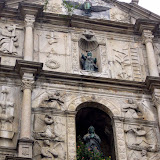The Allegory of the Cave
Wednesday, January 24, 2007 by Eva.Usermaatre

It took me nearly two-week-time to both read and understand the masterpiece- The Allegory of the Cave, which was written by the Great Philosopher Plato. Now I feel that without certain capacity of dealing with these deep thoughts, it is extremely difficult for the commoners to understand.
Let’s first talk about the content of this story: several chained man were in a cavernous chamber underground, with an entrance open to the light. They were so strictly bounded that they could hardly move their heads. “At some distance higher up was the light of a fire burning behind them, and between the prisoners and the fire was a track with a parapet built around it.” “Now behind this parapet imagine persons carrying along various artificial objects.” So some of the prisoners would recognize as reality nothing but the shadows of those objects.
But one day, one lucky prisoner was released from the chains and got the chance of going outside the cave, seeing thing that he never came across. At first, he must not get used to the dazzling sunlight, but he knew there is the sun by using the reflection of the water. At last, he understood that everything exists due to the creation of the sun. It is the sun who created the world.
Unbelievably, he returned to the cave and told the things he saw at outside.
This is the story.
What you have seen through the story?
…………………………………………
why did Plato use a cave? In fact, the cave is the “sense of sight” and the dire-light within it to the power of the Sun. “The ascent to see the things in the upper world you may take as standing for the upward journey into the religion of the intelligible.”
His believe that the world revealed by our sense is not the real world but a poor copy of it and that the real world can only be apprehended intellectually.
Knowledge can not be transferred from teacher to student, but rather that the education consists in directing students’ minds towards what is real and important.
Finally he draws a conclusion that the rulers who should rule over the country should be one that well-educated and know the truth. He can judge things by his wisdom which he gains from the method of philosophy. So the ruler is just like a philosopher.









